
The history of Jordan refers to the history of the Hashemite Kingdom of Jordan and the background period of the Emirate of Transjordan under British protectorate as well as the general history of the region of Transjordan.

Abdullah II bin Al-Hussein is King of Jordan, having ascended the throne on 7 February 1999. He is a member of the Hashemite, who have been the reigning royal family of Jordan since 1921, and is considered a 41st-generation direct descendant of the Islamic prophet Muhammad.
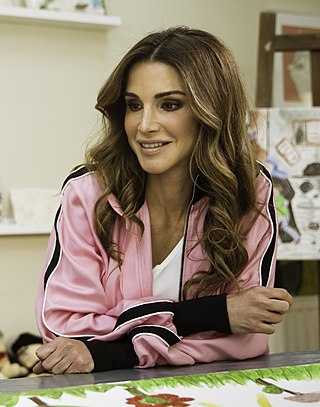
Rania Al Abdullah is Queen of Jordan as the wife of King Abdullah II.

Hamzah bin Al Hussein is the fourth son of King Hussein bin Talal of Jordan overall and the first by his American-born fourth wife, Queen Noor. He was named Crown Prince of Jordan on 7 February 1999, a position he held until his older half-brother, King Abdullah II, rescinded it on 28 November 2004. He is a member of the Hashemite dynasty, the royal family of Jordan since 1921, and is a 41st-generation direct descendant of Muhammad.

Al-Salt, also known as Salt, is an ancient trading city and administrative centre in west-central Jordan. It is on the old main highway leading from Amman to Jerusalem. Situated in the Balqa highland, about 790–1,100 metres above sea level, the city is built in the crook of three hills, close to the Jordan Valley. One of the three hills, Jabal al-Qal'a, is the site of a 13th-century ruined fortress. It is the capital of Balqa Governorate of Jordan.

Hussein bin Abdullah is Crown Prince of Jordan as the eldest son of King Abdullah II and Queen Rania. He is a member of the Hashemite dynasty, the royal family of Jordan since 1921, and is considered to be 42nd-generation direct descendant of the Islamic prophet Muhammad.

Princess Salma bint Abdullah is the second daughter and third child of King Abdullah II and Queen Rania of Jordan.
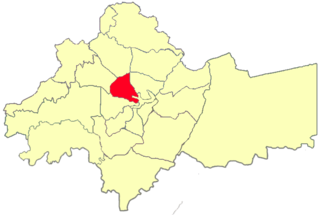
Abdali is an area in the Greater Amman Municipality, Jordan. It is named relative to King Abdullah I who founded it during the 1940s. It covers an area of 15 square kilometres (6 sq mi) in the heart of Amman, with a population of 165,333 in 2015. Large parts of the district are residential, but due its geographical location in the center of the city, it contains several important governmental buildings and businesses. The area is known for containing several bus stations serving routes to many cities in Jordan. It contains the Jabal el-Hussein camp, a Palestinian refugee camp.

Israel–Jordan relations are the diplomatic, economic and cultural relations between Israel and Jordan. The two countries share a land border, with three border crossings: Yitzhak Rabin/Wadi Araba Crossing, Jordan River Crossing and the Allenby/King Hussein Bridge Crossing, that connects the West Bank with Jordan. The relationship between the two countries is regulated by the Israel–Jordan peace treaty in 1994, which formally ended the state of war that had existed between the two countries since the establishment of the State of Israel in 1948, and also established diplomatic relations, besides other matters. Relations between the countries get strained from time to time, usually over tensions at the Al-Aqsa mosque. On 8 October 2020, Israel and Jordan reached an agreement to allow flights to cross over both countries’ airspace.

The Bani Hamida are a nomadic Bedouin tribe living in Jordan.
The Adwan Rebellion or the Balqa Revolt was the largest uprising against the newly established Transjordanian government, headed by Mezhar Ruslan, during its first years.
Her Royal Highness Princess Basmah Hamzah is the second wife of Hamzah bin Hussein of Jordan.

Theeb is a 2014 internationally co-produced period drama thriller film written and directed by Naji Abu Nowar. It is a coming-of-age story about a Bedouin boy, Theeb, who must survive in the wide-open Wadi Rum desert. The film takes place during the Middle Eastern theatre of the First World War, in the wake of the Great Arab Revolt against the ruling Ottoman Empire. The film used non-professional actors from the Bedouin community in southern Jordan, and is considered a "Bedouin Western". It has also been described as a coming-of-age film. Theeb is an international co-production between Jordan, the United Kingdom, the United Arab Emirates (UAE) and Qatar.
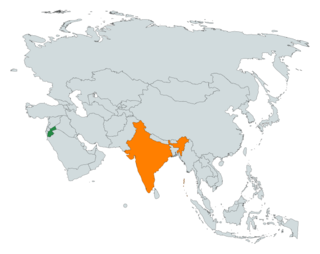
The Republic of India and the Hashemite Kingdom of Jordan signed their first bilateral agreement for cooperation and friendly relations in 1947. The agreement was formalized in 1950, when India became a republic, and full diplomatic relations were established between the two countries.
Mabarrat Um Al Hussein is a charity for boys in northern Amman, founded by the late Queen Zein Al Sharaf of Jordan in 1958. The facility works to provide shelter and education for Jordanian boys aged 6 to 18 from troubled homes and was the first charity of its kind in Jordan.
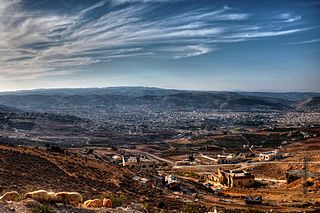
The Balqa, known colloquially as the Balga, is a geographic region in central Jordan generally defined as the highlands east of the Jordan Valley in between the Zarqa River to the north and the Wadi Mujib gorge to the south.
Soraya Salti (c.1971–2015) was a Jordanian national and an American citizen social entrepreneur and educational innovator, who served as the Senior Vice President of Middle East/North Africa for Junior Achievement Worldwide, and founded its regional office,INJAZ Al-Arab.
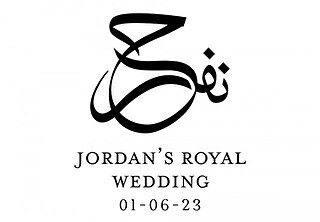
The wedding of Al Hussein bin Abdullah, Crown Prince of Jordan, and Rajwa Al Saif took place at Zahran Palace in Amman, Jordan on 1 June 2023.















